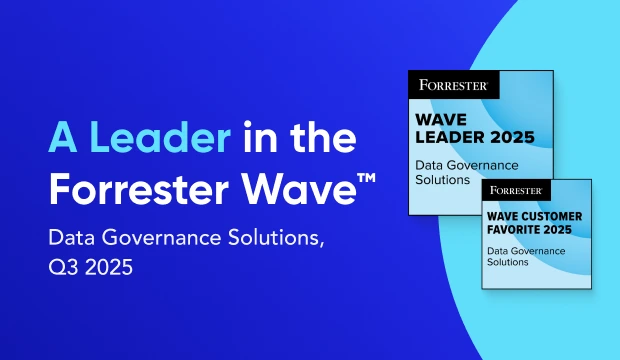What is Data Privacy? Importance, Examples & Difference!

Share this article
Data privacy is a set of regulations that govern the responsible handling, protection, and control of individuals’ personal information to prevent unauthorized access or usage.
It is crucial for safeguarding individuals’ sensitive information, preventing identity theft, and maintaining trust in digital interactions.
Ignoring data privacy risks unauthorized access, misuse of personal data, reputational damage for organizations, and legal consequences due to non-compliance with privacy regulations. Prioritizing data privacy is essential for building a secure and ethical digital ecosystem.
Modern data problems require modern solutions - Try Atlan, the data catalog of choice for forward-looking data teams! 👉 Book your demo today
In this article, we will understand:
- What is data privacy?
- 4 Reasons why data privacy is important
- Difference between data privacy and data protection
- 7 Data privacy principles
- How can your business ensure data privacy?
Ready? Let’s dive in!
Table of contents #
- What is data privacy?
- 4 Reasons why data privacy is important
- Data privacy vs data protection: How are they different?
- 3 Data privacy examples from everyday life
- Top 3 data privacy rules of the world
- What is data privacy compliance?
- 7 Data privacy principles
- 4 Ways businesses can ensure data privacy
- Bottom line?
- What is data privacy: Related reads
What is data privacy? #
Data privacy is a fundamental principle ensuring that individuals have control over their personal information. It dictates how data is collected, used, and shared. This control is crucial because it safeguards individuals from unauthorized access and protects against identity theft.
Ensuring data privacy also preserves confidentiality. When personal information is handled responsibly, individuals can trust that their sensitive data won’t be misused or disclosed without their consent.
Neglecting data privacy comes with significant risks. One major concern is the increased likelihood of data breaches. If personal information falls into the wrong hands, it can lead to identity theft, financial loss, and other malicious activities.
Failure to prioritize data privacy can also result in legal consequences. Many countries and regions have enacted strict data protection laws, and non-compliance can lead to hefty fines and penalties. Additionally, there’s a risk of reputational damage. Companies that don’t adequately protect customer data may suffer a loss of trust, damaging their brand image.
In short, data privacy is vital for protecting individuals, maintaining confidentiality, and avoiding the severe risks associated with data breaches, legal repercussions, and reputational harm.
4 Reasons why data privacy is important #
Our personal and professional data forms the backbone of countless interactions and decisions. Grasping the true value of data privacy is paramount for experts who navigate this vast and intricate data landscape every day.
Here are four reasons why data privacy is critical:
- Keeping trust and building a good reputation
- Avoiding big problems with money and law
- Being in the driver’s seat of your information
- Guarding against sneaky digital thieves
Now, let us understand this importance in brief:
1. Keeping trust and building a good reputation #
Imagine giving a friend something valuable. You’d want them to care for it, right? It’s the same with our personal info and businesses. When they protect our info, we trust them. But if they mishandle it, trust breaks, and it’s hard to rebuild.
2. Avoiding big problems with money and law #
Think about the rules we all follow in daily life – like traffic lights or not littering. If we break these rules, there can be penalties, right? The same goes for businesses and how they handle our information.
There are rules they need to follow. If they don’t, they can get into trouble, like having to pay a lot of money or facing legal issues.
Plus, if they’re careless and let our information get stolen or lost, it can cost them even more. It’s like spilling juice on an expensive carpet; cleaning up can be costly!
3. Being in the driver’s seat of your information #
How would you feel if someone went through your things without asking? Not great, right? Data privacy is like that – it’s about having a say over your own stuff.
When businesses respect data privacy, they’re letting you decide who gets to see your information and why.
It’s like letting you lock your diary and decide who gets the key. This control makes us feel empowered, knowing that our secrets are safe and only shared when we say so.
4. Guarding against sneaky digital thieves #
We all lock our doors to keep strangers out. Similarly, our personal information needs protection, but from digital bad guys called hackers or cybercriminals.
These people are always looking for ways to sneak in and take information that doesn’t belong to them.
When businesses prioritize data privacy, they’re putting up strong digital walls and locks. This keeps our information safe from online thieves who might want to harm us or misuse our details.
In simple words, data privacy is like keeping our secrets in a treasure chest. We trust those who guard it well, and we want the power to decide who gets a peek. Plus, we definitely don’t want any pirates running off with our treasure!
Data privacy vs data protection: How are they different? #
Data privacy focuses on the ethical and responsible handling of personal information, while data protection involves implementing measures to safeguard data from unauthorized access or breaches.
When you hear the words “data privacy” and “data protection”, you might think they mean the same thing. And while they’re related, they actually have different focuses. Let’s break them down in a straightforward way.
Data privacy #
Think of data privacy as the rules of the game. It’s about making sure that when someone collects, uses, or shares your personal information, they do it in a way that respects your choices and rights.
It’s like when you tell a friend a secret and ask them not to share it - you expect them to respect your wishes.
Data protection #
Now, data protection is more about the tools and methods we use to keep that information safe. Imagine that same secret you told your friend. Data protection is like your friend putting that secret in a safe box, locking it, and ensuring nobody else can open it.
It’s all about keeping unwanted eyes and hands away from your precious information.
So, in simple terms:
- Data privacy is about respecting and following the rules when handling personal details.
- Data protection is about keeping those details safe from prying eyes.
Though they might sound similar, understanding the differences can help us be more aware of how our information is handled and kept safe.
3 Data privacy examples from everyday life #
Understanding data privacy examples is a fundamental aspect of creating a secure and responsible data environment, ensuring compliance, building trust, and making informed decisions to protect sensitive information.
Here are three relatable examples from everyday life that illuminate the intricacies of data privacy are:
- Sharing on social media
- Your health information at the doctor’s
- Shopping online
Let us dive deeper into these examples:
1. Sharing on social media #
When you post a photo or like something on sites like Facebook, you’re sharing a bit about yourself. But guess what? You can choose who sees it! It’s like picking guests for your birthday party - you decide who’s in and who’s out.
2. Your health information at the doctor’s #
Now, let’s talk about when you visit the doctor. You share a lot of personal health information, right?
This information is super private, and we wouldn’t want just anyone reading it. That’s why hospitals and clinics have strong rules in place.
Only certain people, like your doctor or nurse, are allowed to see this information. It’s a bit like having a secret diary where only a few trusted people have the key.
3. Shopping online #
Imagine you’re buying a toy or a dress online. You enter your home address for delivery, your phone number in case they need to call you, and your payment details to buy the item.
But here’s the good news: the online shops have special measures to keep this information safe.
They make sure that only the necessary people, like the delivery person, know your address and not everyone else. It’s kind of like whispering a secret to a friend – only they can hear it, and they promise not to tell anyone else.
So, whether you’re updating your social media, visiting the doctor, or shopping online, there are systems in place to make sure your private information stays safe and sound!
Top 3 data privacy rules of the world #
Let’s talk about the rules different places have made to keep our personal details safe when we’re online or when companies have our information. The top three data privacy laws in the world are:
- General data protection regulation (GDPR)
- California consumer privacy act (CCPA)
- Data protection act (DPA)
Let us understand these laws in detail:
1. General data protection regulation (GDPR) #
You live in Europe where the GDPR rule exists. This rule says you control your own info. Before a company gets your details, they must ask you and explain why.
If you’re curious about what info they have, you can ask. If you want, they have to delete it or return it. It’s about your control.
2. California consumer privacy act (CCPA) #
Now, let’s think of sunny California. People living there have a special rule just for them called the CCPA.
This rule says that if you live in California, companies have to be clear about what personal stuff they’re collecting from you.
Not just that, they also have to tell you why they want it and who else they might be sharing it with. It’s like making sure no one is gossiping about you without your knowing!
3. Data protection act (DPA) #
Hopping over to the UK, they have their own rule named the DPA. This rule is like a friendly guard that watches over how companies, organizations, or even the government use your details.
It makes sure no one’s being sneaky or careless with your info. They have to be open about why they want your details, keep it safe like a treasured secret, and never share it in a bad way.
These are just a few rules from different parts of the world. Many other places have their own sets of rules, all made to keep our personal details safe and sound. It’s like each country making its own cozy safety blanket for its people’s information. So wherever we are, we can feel a little more secure knowing there are rules looking out for us.
What is data privacy compliance? #
Data privacy compliance is like a set of rules that companies need to follow to ensure they’re treating our personal information with respect. Just like how schools have rules to ensure students behave and companies have policies to make sure workers are safe, there are rules in place to make sure companies handle our personal details properly.
Why is it important? #
Imagine if companies didn’t have to follow any rules about how they used our personal information. They could share it with anyone, sell it to other businesses, or even lose it without any consequences!
That would be a scary world. We share our information expecting companies to protect it. Data privacy compliance is a way to ensure that they do just that.
How does it work? #
Governments and organizations around the world understand the importance of keeping personal information safe. That’s why they’ve created rules (often called “regulations” or “laws”) that businesses have to follow. If businesses don’t obey these rules, they can get into trouble, like paying fines or facing legal actions.
For instance, a shop can’t just sell your phone number to a marketing company without your permission. Or an online service can’t leave your password information unprotected. These are basic examples, but data privacy compliance covers a lot more, all with the aim of protecting us.
Data privacy compliance is all about ensuring that when we share our personal details, they’re treated with the respect and care they deserve. It’s like a safety net for our personal information. And in a world where we’re sharing more and more of our lives online, it’s good to know there are rules in place to keep our secrets safe.
7 Data privacy principles #
Imagine you’ve just bought a new toy and you’re super excited to show it off. But you wouldn’t want just anyone snooping around and playing with it, right? The same goes for your personal information.
In a world where so much of our data is online – from our names, addresses, likes, dislikes, to where we shop and whom we chat with – it’s important to know who can see it, use it, and how they protect it. That’s where “data privacy principles” come in. Data privacy principles are:
- Consent
- Data minimization
- Accuracy
- Retention
- Security
- Openness
- Rights of individuals
Let us understand these principles in brief:
1. Consent #
When someone wants to use your data, they should ask for your permission first. Just like someone would knock on your door before coming into your home. This means websites and apps should let you know what they’re going to do with your information before you share it.
2. Data minimization #
Imagine you’re packing a suitcase for a weekend trip. You won’t pack your entire wardrobe, just what you need, right? Similarly, companies should only collect the data they absolutely need and not everything under the sun.
3. Accuracy #
It’s like making sure the details in your diary are correct. If a company has your information, they should ensure it’s accurate. This avoids any mix-ups or confusions later on.
4. Retention #
Think of milk in your fridge. After a while, it goes bad and you throw it out. Similarly, companies shouldn’t keep your data forever. Once they’re done using it for the purpose they told you about, they should delete it or make it anonymous.
5. Security #
Imagine you have a secret diary. You’d probably keep it under lock and key so no one can read it. In the same way, companies should use tools and methods to protect your data from bad people who might want to steal it.
6. Openness #
Hiding things is never fun, especially when it comes to your data. Companies should be clear about how they use your data, and if they make any changes to these rules, they should let you know.
7. Rights of individuals #
Just like you have rights in a playground – to play, to rest, to speak up if something’s wrong – you also have rights when it comes to your data. You should be able to see what data a company has about you, correct it if it’s wrong, and even ask them to delete it.
Data privacy principles are like the rules of a game. They make sure everyone plays fairly and respects one another. They protect our personal information and make sure that companies treat it with the care and respect it deserves. So, the next time you hear about “data privacy”, think about these simple rules and you’ll know exactly what it’s all about!
4 Ways businesses can ensure data privacy #
How to ensure data privacy? Well, here are four effective strategies that businesses can employ to bolster their data privacy measures are:
- Regular checks
- Training the team
- Appointing a guardian
- Building with safety in mind
Let us understand these methods in brief:
1. Regular checks #
Just like you might occasionally check your home for any repairs, businesses need to regularly review how they’re managing data. They look for any weak spots or areas to improve.
2. Training the team #
It’s essential to make sure everyone in the business knows the importance of data privacy. Think of it as teaching everyone in the house where the keys are and how to lock the doors.
3. Appointing a guardian #
Some businesses have a special person (or even a team) whose job is to make sure data stays safe. They’re like the security guards of the data world.
4. Building with safety in mind #
When businesses introduce new services or design new products, they make sure to think about data privacy from the start. It’s like building a house with strong locks and walls.
In a nutshell, data privacy is about keeping promises and building trust. Every business, big or small, must take it seriously for the sake of its customers and its future.
Bottom line? #
Data privacy comprises a collection of rules that oversee the ethical management, safeguarding, and oversight of individuals’ personal data, aiming to thwart any unauthorized access or use.
Keeping trust and building a good reputation, avoiding big problems with money and law, being in the driver’s seat of your information, and guarding against sneaky digital thieves are the reasons why data privacy is important.
The examples of data privacy are sharing on social media, your health information at the doctor’s, and shopping online.
In short, data privacy is crucial for all companies and their workers. It’s not just about following laws but about respecting people and building trust. It’s about creating a safe and open workspace. Every bit of data we save or share needs care and respect. Let’s make sure our company stands as a symbol of trust and safety online.
What is data privacy: Related reads #
- Data Privacy vs Data Security: How & Why They Aren’t Same?
- Privacy in an Open Data World: 10 Ways to Deal With It!
- Data Ethics Unveiled: Principles & Frameworks Explored
- Data Governance and GDPR: A Comprehensive Guide to Achieving Regulatory Compliance
- 7 Real-World Examples of Data Ethics You Need to Know
- The Benefits of GDPR Compliance and Data Governance: Protecting Your Data and Your Business
- How Crucial is Data Governance for Data Privacy?
Share this article











